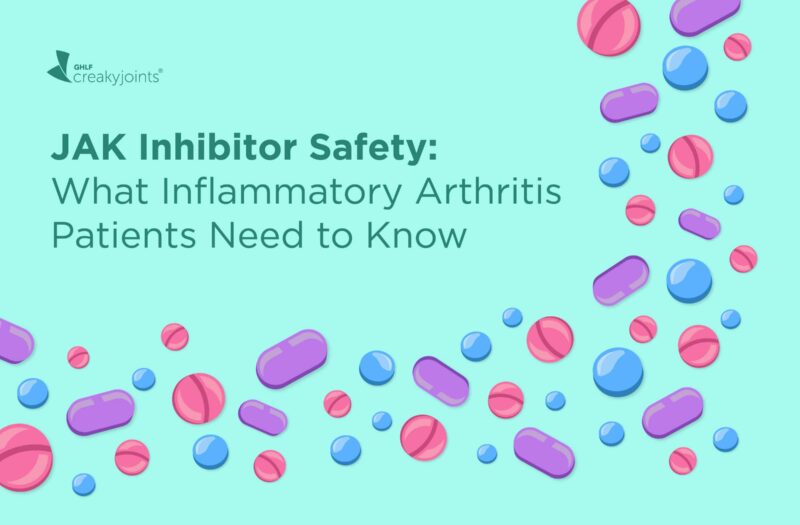The U.S Food and Drug Administration (FDA) just updated the boxed warnings on all three JAK inhibitor medications used to treat inflammatory diseases, emphasizing higher rates of heart events (like heart attack and stroke), certain cancers, and blood clots. As well, the FDA formalized its recommendation that people should only take JAK inhibitors if they’ve already tried a TNF biologic drug.
If you’re already taking a JAK inhibitor or have been thinking about starting one, this news may sound alarming. But like many treatment decisions for inflammatory arthritis that involve weighing the risks and benefits, it’s not a black-and-white issue and it’s important to understand the context, scientific research, and background.
Here’s what you need to know to stay informed and discuss this with your doctor.
JAK Inhibitors for Inflammatory Arthritis: A Brief History
Methotrexate has long been the first-line therapy choice for rheumatoid arthritis (RA). But what happens when this traditional disease-modifying anti-rheumatic drug (DMARD) isn’t well-tolerated or doesn’t get the disease under control? For many years, the next option was to add (or switch to) a biologic medication, usually first a TNF inhibitor like adalimumab (Humira) or etanercept (Enbrel).
That changed about a decade ago, when tofacitinib (Xeljanz) became the first FDA-approved Janus kinase (JAK) inhibitor for rheumatoid arthritis. The approval of two other JAK inhibitors — baricitinib (Oluminant) and upadacitinib (Rinvoq) — soon followed.
Many hailed the introduction of JAK inhibitors for inflammatory arthritis as potentially gamechanging. First approved for RA, these therapies are currently also being studied in psoriatic arthritis, axial spondyloarthritis, and more.
Patients tend to like that these drugs are taken orally, whereas biologics must be given as an injection or intravenous infusion. What’s more, numerous studies have demonstrated that JAK inhibitors — targeted disease-modifying medications that decrease your body’s production of specific enzymes associated with RA disease activity — work really well. In some instances, they even seem to outperform biologics, though results vary by individual drug as well as individual patient response.
Like any medication, JAK inhibitors are not risk-free. Tofacitinib, baricitinib, and upadactinib have all carried boxed warnings (also called black box warnings) since they were first FDA approved. Initially, tofacitinib and upadacitinib’s warnings focused on an increased risk of serious infections and lymphoma; baricitinib’s label warned about an increased risk of serious infections, lymphoma, and blood clots.
In 2019, the FDA updated the boxed warning for tofacitinib to note that people who take the 10 mg dose (vs. the 5 mg dose) have an increased risk of blood clots and death. Although the 10 mg dose is not approved for people with RA — it’s primarily used for ulcerative colitis, a type of inflammatory bowel disease — the news was concerning.
What’s Happening Now?
Fast forward to September 2021, which is when the FDA finished analyzing a post-marketing study designed to further assess the safety of tofacitinib. (A post-marketing study is done after a drug gets FDA approval to see whether additional side effects or safety concerns have occurred.)
This study, which is known as ORAL Surveillance, compared the lower dose (5 mg) of tofacitinib to TNF blocker biologics (these include such medications as adalimumab/Humira and etanercept/Enbrel). It concluded that tofacitinib has “an increased risk of serious heart-related events such as heart attack or stroke, cancer, blood clots, and death.”
Importantly, the study only looked at tofacitinib and not the other two JAK inhbitors.
As a result of the study, the FDA announced that it would require the boxed warning on tofacitinib to reflect these new findings, but it didn’t stop there. It would also require other JAK inhibitors approved for rheumatoid arthritis (baricitinib and upadacitinib) to carry the same warnings, despite the fact that the study this warning is based on a study that only looked at tofacitinib. The FDA’s perspective is that these drugs are in the same class, share the same mechanisms of action, and therefore may have the same risks as tofacitinib.
What’s more, the FDA said that it would now limit use of JAK inhibitors to RA patients who had first tried and failed at least one TNF inhibitor. (In other words, patients would no longer have the option of trying a JAK inhibitor before a TNF blocker.)
Since ORAL Surveillance came out, the agency has also essentially paused their review of applications asking the FDA to extend approval of JAK inhibitors for the treatment of psoriatic arthritis and axial spondyloarthritis.
The Latest Research on JAK Inhbitor Safety
Most recently, in November 2021, studies that analyzed some of the ORAL Surveillance data were presented at the American College of Rheumatology’s annual meeting (ACR Convergence 2021). One study delved further into the link between tofacitinib and major adverse cardiovascular events (like heart attack and stroke). It confirmed that people using tofacitinib had a higher risk of cardiovascular events compared to those using TNF biologics, but found that the risk was most significant for those who were current smokers, aspirin users, male, or age 65 or older.
Another group of researchers analyzed the connection between tofacitinib and cancer. Their study confirmed that tofacitinib carries a higher risk of cancer but determined that RA patients who were 65 or older or current or former smokers were the most likely to develop cancer after using tofacitinib.
It’s worth noting that TNF inhibitors also carry boxed warnings about the increased risk of serious infection and lymphoma, but these drugs have not been linked to an increased risk of blood clots or cardiovascular events.
Meanwhile, a third study presented at the ACR Convergence didn’t use data from ORAL Surveillance but instead relied on a real-world database of health insurance claims to compare tofacitinib to TNF inhibitors. The authors of this study, which is known as STAR-RA, concluded that average RA patients who used tofacitinib were not any more likely than those taking TNF drugs to have a serious cardiovascular event. They only saw an increased risk among tofacitinib users who also had known cardiovascular disease risk factors or a history of cardiovascular disease.
The Reaction from Rheumatologists
Dr. Norton added that the post-marketing study on tofacitinib doesn’t actually show that tofacitinib is dangerous for everyone with RA. She pointed out that most of the study participants who had a heart attack or stroke or developed lung cancer were smokers over age 65. And everyone in the study was 50 or older and had at least one additional risk factor for cardiovascular disease (besides having RA).
Vibeke Strand, MD, an Adjunct Clinical Professor at Stanford University and biopharmaceutical consultant, similarly wasn’t convinced that the post-marketing study was reason for widespread concern. She said that the research did find a statistically significant increase of major cardiovascular events among tofacitinib users compared to TNF blocker users, but the hazard ratio (which suggests how likely it is that an event will occur) was small.
“For us to worry, [the ratio is] something like 3; we’re talking about 1.47 [for the 5 mg tofacitinib group] and 1.48 [for the 10 mg group],” says Dr. Strand. “I’m not going to discount it altogether, but the study is underpowered,” meaning she doesn’t believe the study was big enough to draw such broad conclusions.
Dr. Strand also said that there is no clear mechanism of action that explains why tofacitinib might carry a higher risk of cardiovascular problems. Without that information, there’s no way to know if there’s actually something about this drug that’s bad for your heart or whether the association is due to another unknown factor. It’s even possible that TNF users had a lower risk because TNF inhibitors might somehow be protective, as some older research has suggested.
The FDA’s decision to require patients to “fail” a TNF blocker before using a JAK inhibitor was also met with concern from rheumatologists, because it means that patients and their providers who wish to try a JAK inhibitor after methotrexate would likely be denied that option by insurance companies.
How significant an obstacle this is, however, is debatable. In reality, most patients who fail methotrexate start with a TNF blocker anyway, says Dr. Strand. “Insurance won’t usually pay for a JAK otherwise,” she says.
Dr. Norton agreed that that’s sometimes what happens in practice, but lamented the additional obstacle. “Every time a [warning] label or insurance policy dictates what a ‘correct’ therapy is instead of allowing for shared decision-making by the patient and provider, that’s not optimal care,” she says.
What Does This Mean for Patients?
First, you should never stop a medication without consulting your doctor. You should also know that if you’re currently on a JAK inhibitor or considering starting one, that might still be okay — or maybe you’d be better off considering a different treatment.
Choosing the right medication for you comes to patient preference (pills vs. injections vs. infusions?), comorbidities (do you have major heart disease risk factors or a history of blood clots or cancer?), and what therapy best controls your arthritis symptoms.
Keeping you safe from potential serious side effects is certainly important, and if you have any concerns about whether a specific drug is okay for you, talk to your doctor.
It’s true that TNF blockers and some other biologics have a longer track record than JAK inhibitors, which might make you or your doctor more comfortable. (A 2020 poll suggested that the majority of rheumatologists would choose to use a TNF blocker before going to a JAK inhibitor.) Despite how well JAK inhibitors often work, “we have 22 years of safety experience with [the TNF drugs],” says Dr. Strand. “That’s pretty hard to argue with.”
If you’re leaning toward a JAK inhibitor or already on one, ask your doctor if need a cardiac workup to assess your current heart health or periodic testing to keep tabs on it. If you have an above-average risk of blood clots and go on a JAK, your doctor might put you on a blood thinner as the same time, adds Dr. Strand.
Ultimately, keeping your RA in remission or as close to it as possible should also be a top priority. A biologic drug might get you there, but some people need a JAK inhibitor to make that happen. Poorly controlled inflammatory arthritis in and of itself can increase your risk for heart disease and a long list of other health complications.
The new FDA warning is “not going to change how I practice… because there’s a reason why I put a patient on a JAK inhibitor,” rheumatologist Kathryn Dao, MD, said during the RheumNow discussion. “To me the real threat is active disease.”
Use Our ArthritisPower App to Manage Your Arthritis
Join CreakyJoints’ patient-centered research registry to track your symptoms, disease activity, and medications — and share with your doctor. Learn more and sign up here.
AbbVie Provides Update Regarding RINVOQ® (upadacitinib) in Psoriatic Arthritis and Ankylosing Spondylitis in the U.S. AbbVie News Center. June 25, 2021. https://news.abbvie.com/news/press-releases/abbvie-provides-update-regarding-rinvoq-upadacitinib-in-psoriatic-arthritis-and-ankylosing-spondylitis-in-us.htm.
Brooks M. FDA Approves Upadacitinib (Rinvoq), New JAK Inhibitor for RA. Medscape. August 19, 2019. https://www.medscape.com/viewarticle/916987.
Calip GS, et al. Tumor Necrosis Factor-Alpha Inhibitors and Risk of Non-Hodgkin Lymphoma in a Cohort of Adults with Rheumatologic Conditions. International Journal of Cancer. September 2018. doi: https://doi.org/10.1002/ijc.31407.
Charles-Schoeman C, et al. Risk Factors for Major Adverse Cardiovascular Events in Patients Aged ≥ 50 Years with RA and ≥ 1 Additional Cardiovascular Risk Factor: Results from a Phase 3b/4 Randomized Safety Study of Tofacitinib vs TNF Inhibitors [abstract]. Arthritis & Rheumatology. November 2021. https://acrabstracts.org/abstract/risk-factors-for-major-adverse-cardiovascular-events-in-patients-aged-%e2%89%a5-50-years-with-ra-and-%e2%89%a5-1-additional-cardiovascular-risk-factor-results-from-a-phase-3b-4-randomized-safety-stud.
Curtis J, et al. Malignancies in Patients Aged ≥ 50 Years with RA and ≥ 1 Additional Cardiovascular Risk Factor: Results from a Phase 3b/4 Randomized Safety Study of Tofacitinib vs TNF Inhibitors [abstract]. Arthritis & Rheumatology. November 2021. https://acrabstracts.org/abstract/malignancies-in-patients-aged-%E2%89%A5-50-years-with-ra-and-%E2%89%A5-1-additional-cardiovascular-risk-factor-results-from-a-phase-3b-4-randomized-safety-study-of-tofacitinib-vs-tnf-inhibitors.
FDA Approves Boxed Warning About Increased Risk of Blood Clots and Death with Higher Dose of Arthritis and Ulcerative Colitis Medicine Tofacitinib (Xeljanz, Xeljanz XR). FDA Drug Safety Communuication. U.S. Food & Drug Administation. February 4, 2021. https://www.fda.gov/drugs/drug-safety-and-availability/fda-approves-boxed-warning-about-increased-risk-blood-clots-and-death-higher-dose-arthritis-and.
FDA Requires Warnings about Increased Risk of Serious Heart-Related Events, Cancer, Blood Clots, and Death for JAK Inhibitors that Treat Certain Chronic Inflammatory Conditions. FDA Drug Safety Communuication. U.S. Food & Drug Administation. December 2021. https://www.fda.gov/drugs/drug-safety-and-availability/fda-requires-warnings-about-increased-risk-serious-heart-related-events-cancer-blood-clots-and-death.
Giles JT, et al. Cardiovascular Safety of Tocilizumab Versus Etanercept in Rheumatoid Arthritis: A Randomized Controlled Trial. Arthritis & Rheumatology. January 2020. doi: https://doi.org/10.1002/art.41095.
Interview with Hillary Norton, MD, a Santa Fe-based rheumatologist and clinical trial investigator
Interview with Vibeke Strand, MD, Adjunct Clinical Professor at Stanford University and biopharmaceutical consultant
Khosrow-Khavar F, et al. Risk of Cardiovascular Outcomes in Patients Treated with Tofacitinib: First Results from the Safety of TofAcitinib in Routine Care Patients with Rheumatoid Arthritis (STAR-RA) Study. Arthritis & Rheumatology. November 2021. https://acrabstracts.org/abstract/risk-of-cardiovascular-outcomes-in-patients-treated-with-tofacitinib-first-results-from-the-safety-of-tofacitinib-in-routine-care-patients-with-rheumatoid-arthritis-star-ra-study.
Olumiant FDA Approval History. Drugs.com. https://www.drugs.com/history/olumiant.html.
Rao M. ACR 2020 Debate: JAK Inhibitors vs Biologics After Methotrexate Failure in RA. November 12, 2020. Rheumatology Advisor. https://www.rheumatologyadvisor.com/home/conference-highlights/acr-convergence-2020/debate-american-college-rheumatology-2020-jak-inhibitors-vs-biologics-in-rheumatoid-arthritis.
Rheumatologists Speak Out on New FDA JAK inhibitor Boxed Warnings. RheumNow. September 7, 2021. https://rheumnow.com/video/rheumatologists-speak-out-new-fda-jak-inhibitor-boxed-warnings.
Traynor K. FDA approves tofacitinib for rheumatoid arthritis. American Journal of Health-System Pharmacy. December 2012. doi: https://doi.org/10.2146/news120088.






